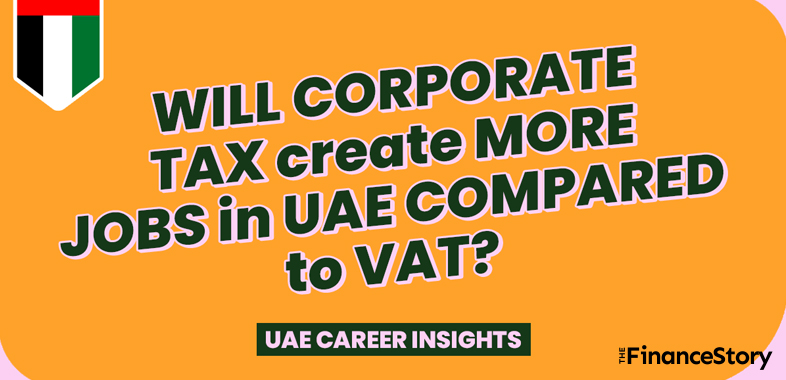The UAE has recently introduced a 9% Corporate Tax, making it one of the last countries in the Gulf Cooperation Council (GCC) to introduce the said tax.
The Kingdom of Saudi Arabia (KSA) was the first GCC member to levy Corporate Tax, making it effective from 2004.
However, the UAE is not a new player in the tax field as Customs and Excise system was implemented in 2017, with Value Added Tax (VAT) getting launched the following year.
The implementation of these taxes is crucial for the growth of the UAE’s economy.
Let’s explore why UAE decided to levy a Corporate Tax, and what new opportunities it will create compared to VAT.
Why Corporate Tax was introduced in the UAE
The introduction of Corporate Tax in the UAE was driven by global developments aimed at addressing profit shifting and tax avoidance.
Initiatives like the Base Erosion and Profit Shifting (BEPS) framework played a crucial role in formulating measures for profit reallocation based on sales.
The objective was to establish a global minimum effective tax rate that would prevent governments from experiencing losses in tax revenues.
On December 9, 2022, the UAE issued the law for the taxation of corporations and businesses (CT law), marking the first large-scale introduction of Corporate Tax in the country.
This move sought to incorporate global best practices and minimize the compliance burden for UAE businesses.
With CT becoming effective from 1st June 2023, it supports the UAE’s strategic ambitions and incentivizes business establishment and expansion.
Furthermore, it solidifies the UAE’s position as an international business hub and global financial center.
Opportunities created in the UAE because of VAT
When a 5% Value Added Tax (VAT) was introduced in 2018, many businesses in the UAE faced challenges in sustaining their operations.
In the UAE, there are over a thousand consultancy firms, including audit firms, that operate to serve the needs of businesses.
These firms require subject matter experts who can effectively connect with clients and provide valuable insights and guidance.
This created multiple opportunities for Chartered Accountants who were well-versed in Indian GST or VAT, as the UAE counterpart is relatively simpler. The laws were crafted based on the Gulf Cooperation Council (GCC) framework.
Additionally, expat Chartered Accountants, who were looking to set up consultancy offices in the UAE, had the perfect window of opportunity.
The total revenue collected from 2018 to 2022 (AED 142 billion, which is equivalent to USD $39.4 billion) played a crucial role in supporting UAE government expenditures and financing various public services and infrastructure development projects.
How Corporate Tax will impact the UAE job market
This new Corporate Tax Law in the UAE imposes a 9% rate on taxable business profits exceeding AED 375,000.
Compared to VAT, Corporate Tax presents more complexities and requires specialized expertise in transfer pricing and taxation.
As a result, businesses would need to invest significantly, in building their capabilities in these areas.
Advisory role:
- “Since Corporate Tax has just been introduced in the UAE, hiring for Advisory roles will be in full swing for the next two-three years.
- Whereas opportunities for compliance and litigation will start increasing after the implementation phase is over,” says Nanjundaswamy T C, a seasoned tax expert who moved from a Big 4 in India to Baker Tilly Middle East.
Starting a firm in the UAE:
- As of July 2022, the total number of registered businesses in the UAE is 665,246.
- “Any CA who wants to set up a consultancy firm in UAE should gear up,” says CA James Mathew, Managing Partner at UHY James Chartered Accountants.
Outsourcing:
- I have seen many outsourcing firms providing VAT return filing services to the UAE.
- “In fact, outsourcing will increase with the arrival of Corporate Tax, but only after the implementation phase,” says Hany Elnaggar, Associate Partner at WTS Dhruva, a leading Tax Firm in the UAE.
Furthermore, the UAE’s extensive network of over 130 double-taxation agreements has the potential to significantly boost trade volume.
This, in turn, will attract businesses to the UAE, leading to increased economic activity, and the subsequent job growth in the tax domain.
The UAE tax industry is expected to grow as businesses and individuals get used to the new tax system.
The introduction of these taxes will help in raising revenue, promote fairness between domestic and foreign businesses, and enhance the overall tax compliance environment.
Anyone who aims to build a tax career in the UAE should bring their technical knowledge of complex matters and an open mind.
This article features insights and perspectives of Nanjundaswamy T C, Head of Taxes – Baker Tilly Middle East, and Hany Elnaggar, Associate Partner at WTS Dhruva derived from The Finance Story LinkedIn live.







